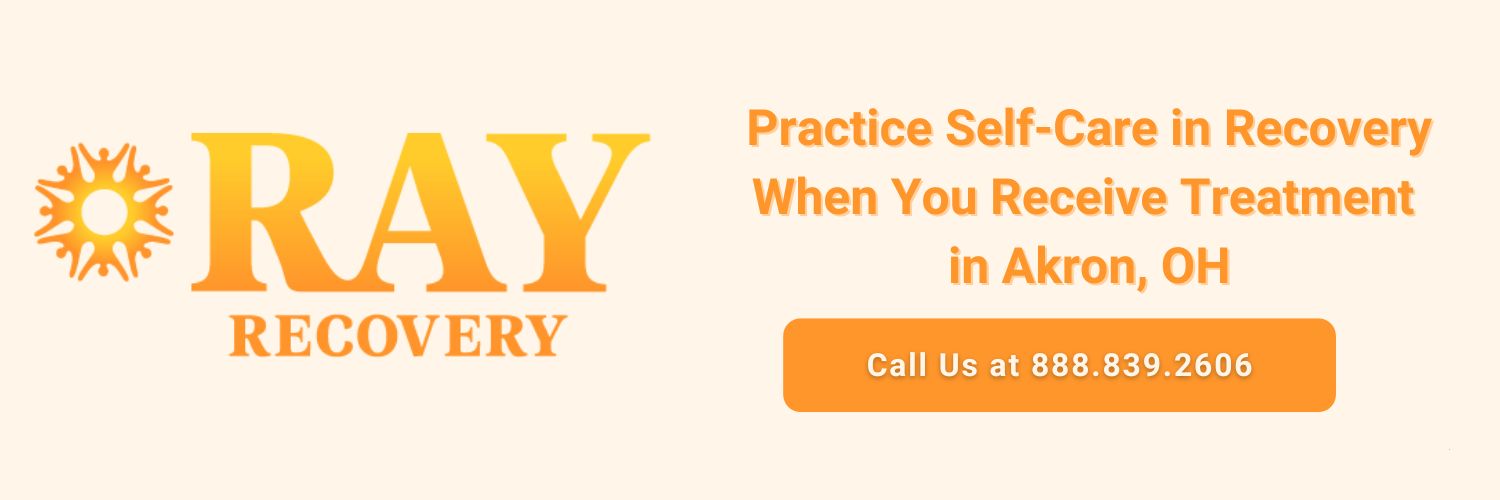Detox, therapy sessions, counseling, outpatient treatment plans — these may be what comes to mind when you think of addiction recovery and what it entails. Addiction recovery does make use of those things, but a full recovery program involves more than those treatment options.
Beginning a recovery journey — and continuing the journey successfully — includes taking care of yourself, body, soul, and spirit. Staying physically active, nurturing your emotions, and prioritizing mental health are all part of self-care in recovery.
No matter where you are on your journey, Ray Recovery is here to help. In this guide, we’ll highlight what self-care in addiction recovery is, why it’s important, and how it can benefit you as you strive for a healthy lifestyle as you seek freedom from addiction.
What Does Self-Care Mean in Recovery?
Self-care in recovery means prioritizing your health and wellness. In recovery, you’re focusing on beginning a life of sobriety, so it only makes sense to also take charge of your mental, physical, and emotional well-being.
Self-care involves practicing particular personal activities that can encourage health and sustain sobriety over a long period of time. Recovery isn’t a one-and-done experience — it’s a lifelong commitment, and self-care is a crucial part of keeping that commitment.
Some self-care activities that you add to your life may include:
- Eating nutritious foods
- Sleeping better
- Focusing on proper hygiene
- Practicing yoga
- Starting a new hobby
- Expressing gratitude
- Journaling
- Setting boundaries
- Learning strategies to handle stress
- Meditating
- Spending time in nature
- And more
At Ray Recovery, we help you prioritize self-care through a variety of programs we offer. In addition to our in-patient treatment programs, we offer various forms of therapy to encourage you to focus on yourself. Whether it’s meditative therapy, motivational enhancement therapy, or holistic therapy, we are here to provide hope for the path ahead.
Physical Health
Considering physical health as part of your strategy for self-care in recovery from addiction includes all aspects of keeping your body healthy and in shape. That means not just concentrating on what you’re putting into your body by way of nutrition but also planning the activities you participate in and how you’ll get adequate, quality, and restful sleep.
So let’s break it down. Nutritionally, self-care should include:
- Responding to your body’s needs (hunger, thirst, medical attention)
- Staying hydrated
- Eating a healthy diet
- Limiting sugar and processed foods
Your body also needs physical activity to remain strong and healthy. Studies show that physical activity can build resilience and help patients through the withdrawal process. Some ways to prioritize regular physical movement include:
- Regular exercise
- Yoga classes
- Walking
- Bike riding
- Swimming
- Hiking
Physical health and self-care involve more than just eating the right foods and moving more. Consider these other important aspects of self-care in early recovery:
- Getting enough restful sleep
- Practicing proper personal hygiene
- Repeating positive affirmations to yourself
- Remaining mindful
- Keeping a clean and ordered environment
- Addressing medical concerns
If you don’t know where to start with these recommendations, it might be a good idea to consult your healthcare provider or a nutritionist to help pave the way forward.

Emotional Health
Just as important as physical health, focusing on emotional health is key to self-care and long-term success. Connecting with yourself and making room for introspection are key goals to help sustain you in your recovery.
Here are some examples of ways to emphasize your self-care in recovery through your emotional health:
- Attending therapies
- Engaging in meaningful relationships
- Practicing yoga and meditation
- Connecting with nature
- Practicing solitude
- Participating in group activities
Mental Health
Taking the time to focus on mental health and doing the work that it may entail further strengthens your efforts in recovery. We mentioned mindfulness as a part of physical health, but it’s also crucial for your mental well-being.
Examples of ways to give precedence to your mental health as a part of self-care in addiction recovery include:
- Advocating for yourself
- Attending regular therapy sessions
- Learning new coping strategies
- Connecting with friends, family, coworkers, and others in the recovery community
- Setting healthy boundaries and communicating limits
- Learning a new skill or job
- Prioritizing your responsibilities and asking for help when needed

7 Benefits of Practicing Self-Care in Addiction Recovery
Addiction recovery can be a long road with ups and downs along the way. Placing self-care high on the list of priorities can make the recovery journey a successful one in the long term.
#1: Build a Foundation for Sobriety
We’ve all experienced it. After a hard day at work, you come home to family responsibilities that further tug at your resolve, and then toss and turn and get a terrible night’s sleep. None of that sets you up to handle the stresses of the next day. You end up being cross with coworkers, rude to the cashier at the grocery store, and unable to make any headway with the seemingly simple tasks of the day.
Lack of self-care in recovery can do the same thing, setting you on a fast course to relapse. On the other hand, tending to your physical, mental, and emotional health can set you on track to handle triggers when they come and have the resolve to remain committed to your recovery.
#2: Finding Purpose and Meaning
With newfound strength and goals, your days will be filled with meaningful activities and relationships, leaving less time for boredom and time to think about the substances you used to indulge in.
#3: Address Mental and Emotional Needs
With a solid self-care plan in recovery, you’ll be careful to focus on mental and emotional needs that before may have been ignored. Putting these needs in the forefront can lead to:
- Less stress
- Healthy coping mechanisms
- Resilience to challenges and triggers
- Regulation of your emotions
#4: Promote Physical Health
Focusing on physical health isn’t just a self-care strategy to help in addiction recovery. It is actually a gateway to optimal health for years to come. Some of the benefits you may experience by ranking your physical health as a high priority include:
- Reduced cravings
- Repaired damage done to the body
- Better sleep
- Stronger cardiovascular system
- Improved lung function
- An overall return of strength and vitality

#5: Enhance Self-Esteem and Self-Worth
Self-esteem and self-worth can easily become damaged by addiction. Research points to the idea that negative views of self can contribute to substance use issues, creating a cyclical relationship between self-worth and substance use. Low self-esteem can lead to substance use, which then exacerbates the low self-esteem — and on and on the cycle goes.
Self-care is vital for boosting positive views of self. The following self-care practices are ideas to begin seeing yourself in a positive light:
- Exercise
- Healthy diet
- Good sleep
- Positive affirmations
- Support systems
- Self-forgiveness
- And more
#6: Develop a Positive Mindset
When you begin to see your body, mind, and spirit reacting to consistent self-care, a positive outlook will often follow. Getting stronger physically because of regular exercise shows you the power of success, giving you positive evidence that you can make changes and stick to them. When you open up with friends and family about your genuine struggles, and you find them to be supportive listeners and cheerleaders, you can find the courage and positivity to attack each day and the challenges they bring.
#7: Reduce the Risk of Relapse
No one wants to relapse after they’ve been through addiction treatment, whether in-patient, intensive outpatient, or partial hospitalization treatment. However, without proper planning and a self-care strategy, the risk of relapse may be high.
Instead of leaving a recovery treatment without a plan, consult with friends, family, and the staff at the treatment center to create a solid self-care and aftercare plan that will set you up for success and long-term sobriety.
Ray Recovery: Practice Self-Care in Addiction Recovery With Help From Our Many Treatment Options
If you’re struggling with a substance use addiction and are ready to find lasting help, the team at Ray Recovery is here to help.
We offer a variety of outpatient programs that are personalized based on your needs. Our programs for men and women include:
- Partial hospitalization programs (PHPs)
- Intensive outpatient programs (IOPs)
- Virtual IOP programs
- Therapy services
- And more
We want our clients to have a strong understanding of their addiction and be empowered to gain the skills for long-term recovery. That includes learning self-care skills to practice during treatment and to carry on during ongoing recovery.
Contact us today to see how we can help.
The content in this blog is not intended to be a substitute for professional medical advice, diagnosis, or treatment. Always seek the advice of your physician or other qualified health provider with any questions you may have regarding a medical condition.



